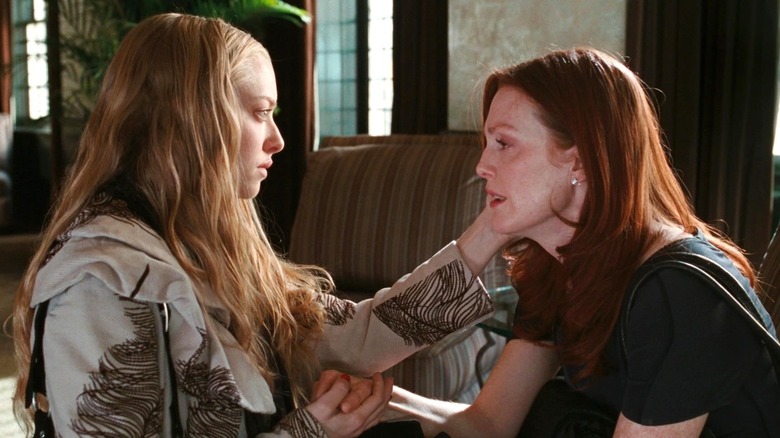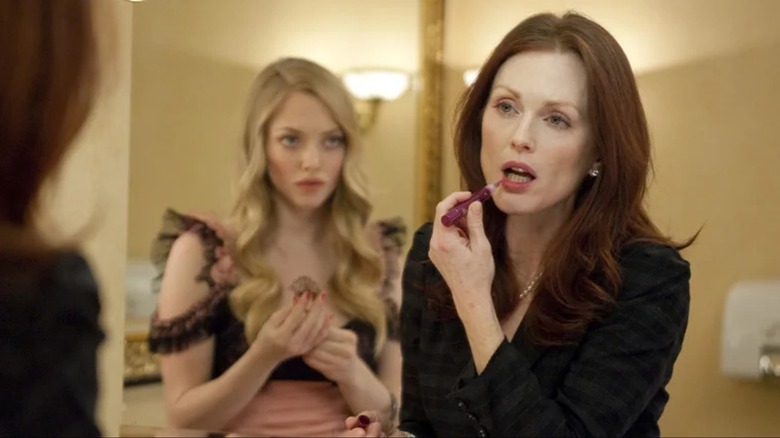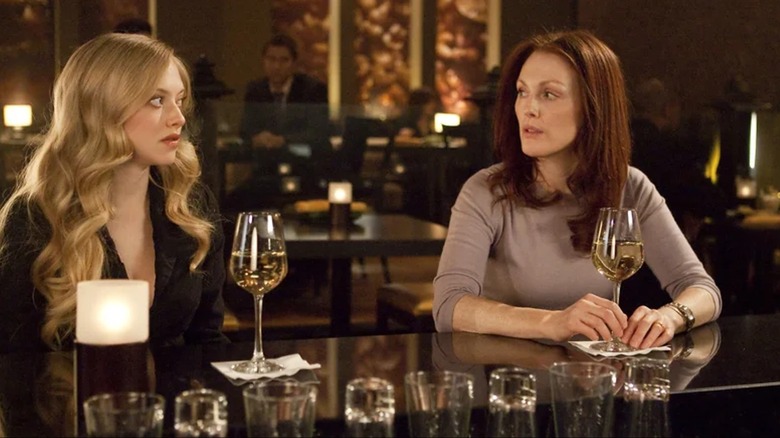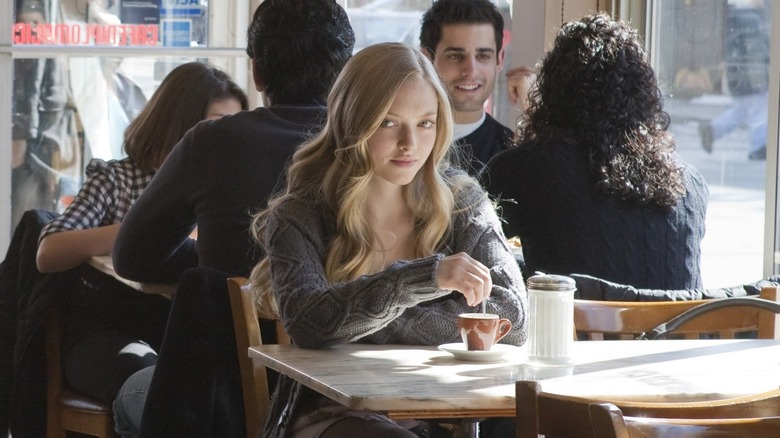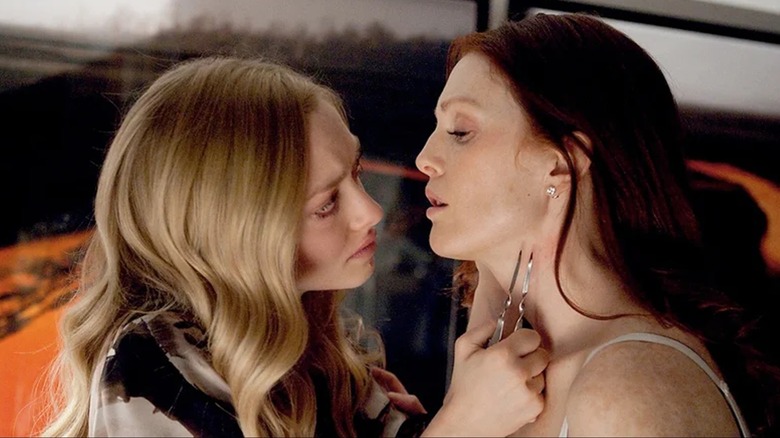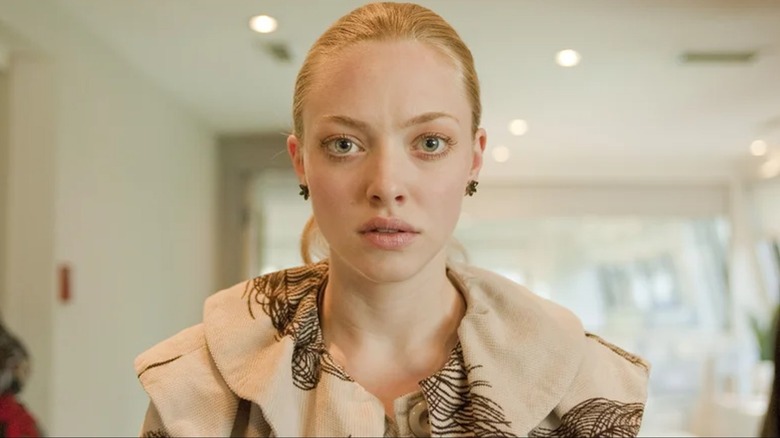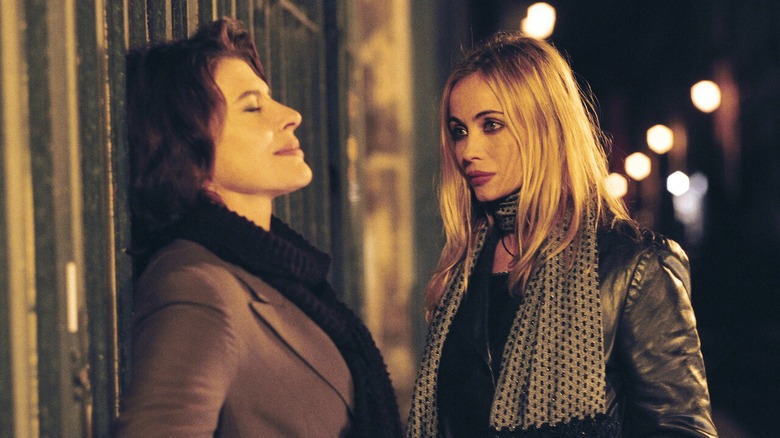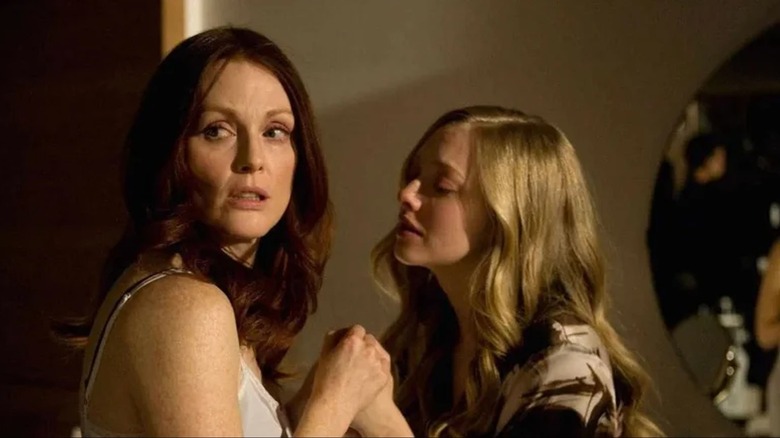Chloe Ending Explained: Lies, Mistrust, & Psychosexual Dilemmas
We may receive a commission on purchases made from links.
Atom Egoyan, who burst into the scene as a part of the Toronto New Wave of the 1980s, has a penchant for making films that are primarily character studies that simmer with psychosexual themes. Egoyan's "Exotica" incorporates the best aspects of an erotic thriller, offering a rich, dizzying descent into a labyrinth of secrets and deceptions, where sexual allure threads together an intriguing plot until the end. Almost 15 years later, Egoyan helmed "Chloe," a remake of the French erotic thriller "Nathalie..." that navigates the anxieties of an older married woman who suspects that her husband is an adulterer. While "Chloe" and "Nathalie..." share the same narrative core, Egoyan's treatment of the subject matter takes some wild turns, culminating in a grisly end that significantly departs from that of the French psychosexual drama.
There's ample potential in Egoyan's film, which centers on the insecurities of Catherine (Julianne Moore), who harbors a complicated relationship with her sexuality, the male gaze, and her worth in the eyes of her husband, David (Liam Neeson). "Chole" could have been a frenetic erotic thriller that luxuriates in these complex emotions — where Egoyan could have furthered the heady, layered explorations of his 1994 film "Exotica" — but the movie stumbles and its sexual intrigue fizzles out before it can entrance us. There's lots to unpack, nevertheless, especially when it comes to its ambiguous ending, which re-contextualizes Catherine as an individual and adds some unsavory context to her behavior throughout the film.
All relationships hinge on power dynamics, and "Chloe" unpacks these unspoken hierarchies, keeping female sexual autonomy and societal perception of sex work at the center. Although Catherine's viewpoint colors our perception of her world, it is Chloe (Amanda Seyfried) who grounds us into a truth that runs deeper than the shock twists that attempt to enliven the third act.
What you need to remember about the plot of Chloe
What does one do when they suspect their spouse of being unfaithful? There are no easy answers, as such situations can be extremely tricky. When accomplished gynecologist Catherine finds a suspicious picture of her husband, David (a college professor), with a young student in his class, her world comes to a standstill. Right from the beginning, Catherine's perception of David is coded in a hyper-specific way; she views him as older, yet charmingly handsome, with an obvious appeal to younger women around him. David's tendency to flirt around does not help matters, and Catherine, instead of confronting him, sets her sights on a sex worker named Chloe to catch him in the act.
While this might feel like a contrivance to propel the plot, it is not difficult to understand Catherine's preference to gather proof of her husband's apparent infidelity as opposed to having an honest conversation with David. The way Catherine views every other woman around her before learning about this supposed betrayal is interesting. One of her clients feels miserable that she's unable to orgasm, and Catherine downplays this as a muscle contraction while maintaining an air of cold aloofness, almost conveying the stance that female sexual satisfaction is immaterial. She seems to perceive her female friends as somehow being inferior to her too, while the women who frequent arbitrarily in public spaces, or those who, in her eyes, infringe upon her home (such as her teenage son Michael's girlfriend Anna), are regarded with quiet rage and contempt.
However, Chloe, whom Catherine observes while the former meets with her fancy clients in upscale bars, emerges as an anomaly amongst her established perception of women as either inferior to herself or a direct threat to her from a psychosexual standpoint.
Catherine's need to be seen drives the plot of Chloe
The root of Catherine's emotional agony when it comes to David's infidelity is her conviction that she's invisible in her husband's eyes because she's aging, i.e. becoming "less attractive" in the process. This, obviously, is a harmful, deep-rooted belief hammered in by patriarchal standards of beauty. Catherine views older men like her husband as ones who get increasingly attractive with age, which is a baffling double standard she's unable to dissect due to her insecurities. This self-deprecating sense of becoming invisible in the context of the male gaze also extends to her son, Michael, who is on the cusp of exercising sexual autonomy, which Catherine finds deeply troubling.
The dreamlike quality that Chloe exudes is intentional, as she flits in and out of the film like a wisp of a person, powerful in the ownership of her sexuality. This freedom is a double-edged sword, as society views Chloe as a means to an end, to the point that dehumanization is ingrained into the sex work that she otherwise enjoys. Enamored and repulsed by everything Chloe represents, Catherine sleeps with her on a whim to simulate how her husband feels while having sex with another woman. This act of sexual stand-in, where she puts herself in David's shoes to feel closer to him, is laced with the same brand of patriarchal misogyny that men like David flippantly partake in.
As a result, Catherine proves herself to be no different than the men who treat Chloe as an object, as she coldly reminds her that their night of passion together was just a business transaction. Although Catherine feels "seen" with Chloe when they sleep together (and Catherine explores her affinity for indirect voyeurism and attraction towards women), she doesn't deem the experience substantial enough to validate it as a meaningful one.
Was Chloe in love with Catherine?
Catherine's dismissive attitude toward Chloe reveals some uncomfortable truths. While she might be genuinely attracted to Chloe, Catherine coldly rationalizes the experience as a surrogate sexual encounter from David's point of view, as opposed to her own. Even in a fleeting moment of pleasure, Catherine is unable to shed the lingering presence of the male gaze dictating problematic yardsticks for what counts as female pleasure. This does not jive well with Chloe, as she is someone who knows exactly what she wants and takes great pride in her ability to anticipate her client's physical and psychological needs.
However, does Chloe's obsession with Catherine begin after the harsh post-hookup rejection? The answer is no; after Catherine decides to confront David about cheating on her with Chloe, she realizes that her husband, although adulterous, has never met the woman before. The erotic stories that Chloe had told Catherine about her affair with David were all made up, making it clear that Chloe's obsession began way before the two developed their complex, charged relationship. It's not difficult to understand why Chloe would become fixated on a beautiful, middle-aged woman who hired her to gauge her husband's fidelity, completely oblivious to the fact that she could be desirable to another woman. While Chloe intimately understands that sexual liberation/psychosexual impulses should not be defined solely by heteronormative standards, her object of desire, Catherine, refuses to disentangle her self-worth from how she's perceived by men. This creates a conflict, making Catherine unattainable in every way and feeding into Chloe's escalating obsession with her.
Is this love? Well, it's complicated, but what matters here is that these intense feelings are compelling enough for Chloe to pursue Catherine in increasingly disturbing ways.
What happened at the end of Chloe?
Realizing that the only way to get under Catherine's skin is to sleep with her son, Michael, Chloe provokes her into lashing out and claims that the boy "reminded" her of Catherine. This is unsavory on multiple levels and reads as Chloe's way of getting back at Catherine for her refusal to acknowledge their hotel room tryst on its own merits. Moreover, the way Chloe seduces Michael is also shot in an eerie, surreal light, like that of a vampire circling its prey before being invited inside their house, where they strike when the time's right. Catherine's reaction to this is understandably intense, but Chloe turns violent by attacking her with a jagged-edged sliver hairpin. The hairpin was one of the first things Catherine had noticed about Chloe when they had first met, and it had functioned as an icebreaker during their first conversation. The fact that an object of allure and interest becomes a weapon channeling rage and envy is a telling metaphor that Egoyan employs towards the end.
A struggle between the two ensues, and Chloe ends up hanging from one of the massive windows and falls to her death soon after. This part does feel sudden and anticlimactic, especially if you watch the film's two alternating endings, which feel bleaker than the theatrical one. How are these endings different?
Chloe's alternate endings
The question of whether Chloe falls by accident or whether she deliberately lets go of the window frame during the climax can be better understood when we take the film's alternate endings into consideration. In the first alternate version, Chloe's voiceover can be heard after her death, where she admits to having fallen on purpose so that she would forever become a part of Catherine's life. The final shot of the hairpin in the theatrical version of the film, where Catherine is seen wearing it during Chloe's funeral, drives this sentiment home. However, this dramatic, obsession-fueled self-sacrifice feels too extreme and uneven, as it's undeniably messed up to die on purpose to tie an already distressed woman to a lifetime of guilt.
The other alternate ending, however, is hollower: this version ends with Catherine's voice-over, where she muses that Chloe's death, although in vain, granted her a second chance at life. This is not only bleak but in extremely poor taste, situating Catherine as a privileged, self-centered person who reframes a woman's grisly death as a do-over in life. All things considered, the film's theatrical ending works best, as it conveys Chloe's death as an unfortunate accident and is subtly ambiguous about Catherine turning a new leaf.
How is the ending of Chloe different from Nathalie...?
Anne Fontaine's "Nathalie..." is more of a slow burn than "Chloe," where much can be gleaned from the unspoken emotions that simmer beneath its surface. Although "Chloe" takes a more direct approach to its central erotic relationship, Fontaine's film merely alludes to it, as the focus is more on how Catherine (Fanny Ardant) completely loses her footing once she's aware of her husband's adultery. After meeting a high-end escort named Marlène (Emmanuelle Béart), Catherine employs her to pretend to be a student named Nathalie and initiate an affair with her husband. Like Egoyan's Chloe, Nathalie also relays the overtly sexual details of this so-called affair to Catherine, who becomes obsessed with spending more time with this woman to satiate some unspoken impulse. However, there's no physical consummation here, although the charged undercurrents of two women growing closer to the point of tender, parasitic codependence are not lost here.
"Nathalie..." ends right when "Chloe" begins to build up its climax: here, Catherine learns that Marlène/Nathalie had never approached her husband and that she had made up the erotic retellings. Although this completely uncovers Nathalie's feelings towards Catherine and solidifies the psychosexual subtext of their relationship, this is where Fontaine's film ends. As Catherine has realized that her husband is not an adulterer by this point, she does not need Nathalie or her services any longer. As a result, she dismisses this revelation, deciding to forgive and forget, as if the nights spent baring her soul to another woman were part of a dream.
What did critics say about the end of Chloe?
No matter which ending appeals to you, it is clear that the ambiguous theatrical ending, which frames the final hairpin shot as both sweet and ominous, is the one that "Chloe" benefits the most from. By deliberately leaving a bad taste in your mouth, Egoyan's erotic thriller dwells on the unsavory nature of Chloe's death, which seems to have been brushed off or altogether forgotten. By wearing Chloe's hairpin, Catherine has re-assumed control of the situation and her life. It is not only a reminder of her experiences with Chloe but also a token that symbolizes the reclamation of her autonomy — at the cost of the death of a woman who belonged to a socio-economic strata that is often relegated to the margins.
The late Roger Ebert seemed to agree with this sentiment in his review of "Chloe," writing, "Egoyan follows his material to an ultimate conclusion. Some will find it difficult to accept. Is it arbitrary? Most of life's conclusions are arbitrary. I am not sure this particular story should, or can, be wound up in a conventional manner." Anna Hornaday, by comparison, took issue with the film's third act at large, writing for The Washington Post, "'Chloe' descends into a preposterous third act that, by any measure, qualifies as a disaster. But it's proof of Egoyan's skill that the film works for as long as it does." Critic Betsy Sharkey also found the ending unsatisfying, writing for the Los Angeles Times:
All that sex and need add up to a whole lot of trouble, but unlike the filmmaker's critically acclaimed 1994 film, "Exotica," where the cerebral intersected with lust and longing in a strip club so that guilt, obsession and responsibility as well as Mia Kirshner's young body were laid bare, "Chloe" stops short. The result is a sort of story interruptus, the thematic possibilities of the sexual balance of power in relationships teased but never to a satisfactory conclusion.
Egoyan, for his part, once spoke to The Rumpus about this borderline obsessive control Catherine wishes to exert over everyone around her. He went as far as to say that Catherine is "completely the villain," as her need to control everything, coupled with her inability to take accountability for her actions, leaves destruction in her wake, which she callously downplays to move forward in life. While framing Catherine as a villain might be a tad too simplistic, as she is also a victim of patriarchal double standards, she is undoubtedly cold and calculated when it serves her best and extends empathy in a way that feels altogether disingenuous.
Chloe's motivations, on the other hand, are never spelled out, as she simply exists as a vehicle of pleasure. "I can become your living, breathing, unflinching dream, and then I can just disappear," she tells one of her clients at one point. And she does disappear, never to be spoken of again, only remembered in the form of a hairpin that was both an instrument of beauty and violence.
"Chloe" is currently available for purchase on Prime Video.
